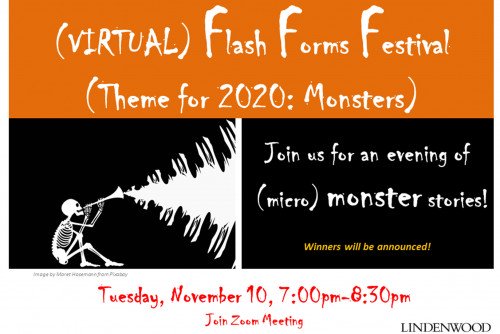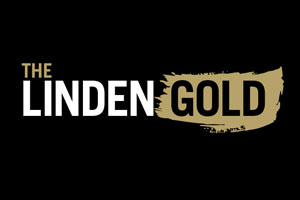
By Hazel Denother
Last year, Lindenwood University’s School of Humanities hosted a Flash Forms Festival for undergraduate and graduate student writers that coincided with Dark Carnival, the university’s annual Halloween celebration. Dr. Kathi Vosevich, School of Humanities dean and director of the competition, explained, “This contest was created last year when we won a grant from the Alpha Chi National Honor Society to hold an academic event to showcase university talent and the honor society.” In receiving this grant, Lindenwood demonstrated its substantial university value and academic rigor, and students gained the opportunity to display their craft and get into the Halloween spirit. Because of the first contest’s considerable success, the flash fiction competition returned this year to the delight of students and faculty.
Gillian Parrish, assistant professor for the MFA in Writing program and coordinator of the competition, stated, “The event was created to encourage and celebrate creative writing among our Lindenwood students.” To enter the competition, undergraduate writers and MFA students had to craft rich, captivating “flash” stories in just 750 words or fewer. Parrish said, “Flash fiction is inviting for more writers, as people are busy. Flash forms can foster good quality writing because the necessary compression helps cultivate more well-honed pieces.” She added that these short pieces are ideal for reading events in which writers showcase their work. “Flash fiction allows for a greater quantity of readers at an event and makes a lively pace that keeps audience attention fresh.”
During the competition’s genesis, its organizers decided that it would be a wonderful addition to the merriment of the annual Dark Carnival festivities. Parrish remarked, “Halloween is a fanciful time in our culture, a time that taps into an imaginative mode.” The inaugural contest’s theme was ‘ghosts,’ and this year, the competition returned with a brand-new ghoulish theme: monsters. Lindenwood faculty recognize that Halloween offers an almost endless supply of topic choices for writing. Traditional figures of the holiday are fascinating subjects for fiction, and they present many exciting avenues for students to explore in their stories. Parrish commented, “Halloween figures such as ghosts and monsters lend themselves to a range of fiction and even memoir. Realistic fiction and creative nonfiction can play with metaphorical ghosts OR monsters—memories and hauntings of a psychological nature. Magical realism, fantasy, and sci-fi writers can open it up into other fresh directions.”
This year, the competition was judged by a team of undergraduate and graduate creative writing professors, all of whom were excited to see what the writers would come up with. “Judges [were looking] for compelling stories, stories told in fresh ways,” Parrish said. Undergraduate and graduate submissions were judged separately, and three winners were selected from each category. Last year, the School of Humanities held an entertaining reading of the winning ghost stories during the Dark Carnival festival. This year, the reading was revamped into a fun virtual event held safely via Zoom on Tuesday, November 10th from 7:00-8:30 PM. There, Dr. Kathi Vosevich announced the winners and gave them the opportunity to share their work.
Fernanda Poblete, the third-place undergraduate winner, kicked off the reading with the chilling “Trick or Treat.” Victoria Lane took second place with the sinister “Fresh Fruit,” and Gia Mesz had listeners on the edges of their seats with her spellbinding, elegant “Wickie,” which won first place. The graduate students read their stories next, starting with Angela Morgan Fox’s humorous and uncanny third-place-winning story “Monster Cookies.” Jillian Rotolo was named the second-place winner with “Another Night with Her,” an unrelentingly frightening tale. Finally, Joanna Byrne rounded off the evening with the eerie “West Texas Legend,” claiming her well-deserved first-place prize. All in all, the event was a great success, and all in attendance had a fantastically spooky good time.
Writing stories is a fun way to get into the holiday spirit, but it can be so much more than that, too. Parrish pointed out, “Creative writing makes meaningful connections on the page and off the page. We see the world in fresh and surprising ways through our fiction, poems, and creative nonfiction.” Storytelling can be incredibly powerful; narratives can unite people, uplift readers, and make life richer. Furthermore, writing allows individuals to interact with and interpret the world in new ways. Parrish explained, “When we are in a writing kind of mind, we find connections between unlikely things, and we find magic in unlikely places. Beyond our own pages, we also connect with others, authors whose books we love and friends we make in writing communities like our MFA in Writing program.”
The faculty are excited about this year’s contest submissions and expect the Flash Forms Festival to keep flourishing as time goes on. Parrish stated, “We would love to continue the event each year, offering a fun and fruitful autumn tradition of writers producing some exciting flash stories.” She hopes that the contest continues to encourage and inspire student writers in the future. Lindenwood is proud of the wonderful flash fiction that its writers have produced through the competition so far, and the university looks forward to all of the stunning works students will create in the years to come.

The Linden Gold
The Linden Gold is a student operated organization focusing on promoting the academic success and achievements of Lindenwood. Through stories about alumni, current students, and faculty alike, The Linden Gold strives to engage with the St. Charles Community and showcase the unique greatness of Lindenwood.












